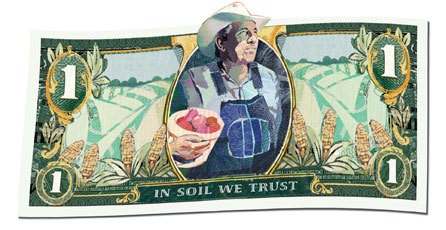Woody Tasch is all about the money.
But not in an evil, greedy-bastid way. For two decades, he’s been pioneering the integration of financial investing with social responsibility. It’s an enormously important undertaking. When investment dollars go to conventional businesses—and the great bulk of funding still does—orthodox business practices are endorsed and sustained. The result: more social injustice and environment decline. When dollars stay local, on the other hand, environmental costs are reduced because there are lower shipping costs, jobs are created that aren’t subjected to the vagaries of global corporate decision-making, and the money circulates in the community, making for a much more robust local economy.
In the 1990s Tasch served as treasurer of the Jessie Smith Noyes Foundation and was the founding chairman of the Community Development Venture Capital Alliance. Subsequently he was chairman of Investors’ Circle, a network of angel investors, family offices, and social-purpose funds and foundations that since 1992 has invested $133 million in sustainability-promoting ventures and venture funds.
Tasch’s latest venture is the Slow Money Alliance, which aims to bring investment dollars to the emerging alternative culture centered around “slow food,” a growing global movement that celebrates community life through locally grown food and eco-gastronomy. The Slow Money Alliance’s mission, offered here in an abbreviated form, is to “support small food enterprises, catalyze increases in foundation grantmaking and mission-related investing in support of sustainable and local economies, and incubate next-generation socially responsible investment strategies.”
In addition to being a leading expert on socially responsible investing, Tasch is an integral thinker with a poetic sensibility. These qualities are on vivid display in his recent book, Inquiries into the Nature of Slow Money: Investing as if Food, Farms, and Fertility Mattered, which combines an indictment of our mainstream money culture with a passionate call for a slower, more humanistic approach to investing.
For Tasch, slow food and slow money go together like, well, grass-fed beef and a fine microbrew. I caught up with him before a talk he gave at Time and Space Limited in Hudson on April 24 on Slow Money/Slow Food.
What’s the essence of your vision?
We live in a culture that’s all about speed, quantity, and growth. It’s a culture that’s profoundly out of balance. We need to slow down, focus more on quality, and reject growth for growth’s sake as the sole benchmark of business success.
Over the years, the socially responsible investing movement has taken a step in this direction. “Patient capital” is the term that’s emerged to describe investors who don’t require companies to maximize returns as quickly as possible. But there’s a tension here. Socially responsible investing is under constant pressure to get more adherents—in other words,to become more mainstream—and this comes with a price. Its core values get diluted.
We need to build a culture that stands as a radiant counterpoint to our dominant hurry-up culture. We need to bring our culture down to earth—and I mean this literally. We need to replenish the soil; we need to remember our connection to the soil; we need to support our local food system; we need to participate in and celebrate the authentic local culture that emerges from these many connections and awarenesses; and we also need to build the financial infrastructure that will enable all this to thrive.
At a founding retreat of the Slow Money Alliance, Peter Kinder, one of the pioneers of the socially responsible investing movement, used the term “deracinated.” It’s a great word that means cut off from our roots. Slow food and slow money are concepts that, together, help us find our roots again.
“Slow money” is an intriguing term.
In my book, I define it as “patient capital on the opposite of steroids.”
And then there’s “slow business”—
That’s an important piece of the puzzle too. The entrepreneurs are the real heroes. While the focus of the Slow Money Alliance is on businesses that are part of the local food system, there’s a growing parallel movement that focuses on supporting businesses that are rooted in place, value quality, and are mission-driven.
This is about changes in organizational structure as well as values. New organizational forms such as social enterprises and so-called B Corporations, which combine for-profit and nonprofit purposes, are emerging.
We’re experimenting with new enterprise structures on the financing side, too. In Santa Fe, for example, there are efforts underway to develop what’s being called a Sustainable Business Investment Cooperative. They want to use the co-op model as a new way to aggregate capital, which would then be deployed locally.

















